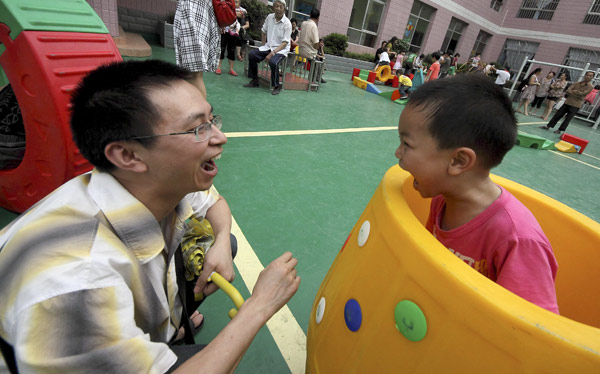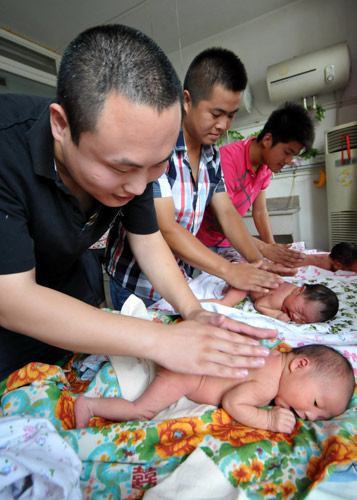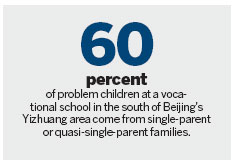Society
Dads are too busy to talk
By Wang Kaihao (China Daily)
Updated: 2011-07-05 08:27
 |
Large Medium Small |
Xiao Xu (not her real name) from Anhui province is a junior in college. For the summer break, her family plans to travel to New York City to visit her uncle. Although they have the required travel visas, they are yet to book their tickets. "I have to wait for my father," Xu says. "I don't know when he will have free time. I don't even know if he will actually travel with us." Xu's father is a civil servant who is devoted to his work. "He is always busy attending conferences or social activities. He also often goes on business trips. And when he does have some spare time, he likes to participate in singing competitions," she says.
|
 A father plays with his boy in Guiyang, Guizhou province. For children from "quasi-single-parent families", playing with their fathers is precious. [Xu Fengshan / for China Daily]
|
Many fathers with flourishing careers face even busier schedules, forcing their children to live in what netizens have dubbed jiadanqin or "quasi-single-parent families".
Not that these fathers don't take any interest in their children's lives, it's just not the way the children want it.
"My dad always squeezed time out for me when I was in high school to attend the teacher-parent conference. He seldom talked to me or got involved with my studies through the year but always scolded me if I didn't produce good exam results," Xu says.
To compensate, she says, her mother is extraordinarily nice to her.
"I spend so much more time with her. She never scolds me and takes my side when my father yells at me."
Xu also shares many interests with her mother such as enjoying Taiwan pop music and South Korean soap operas.
"I've become used to my father's long absences," Xu continues. "Although I am a little scared of him, I can understand him."
Zuo Sha, from the 23-year-old Beijing Maple Women's Psychological Counseling Center, the first NGO to provide counseling on women and family issues in the Chinese mainland, says that mothers are being increasingly forced to shoulder the lion's share of parenting.
|
 Fathers learn how to massage their babies in Xingtai, Hebei province. In the Chinese mainland, mothers are increasingly forced to shoulder the lion’s share of parenting. [Huang Tao / for China Daily] |
"But being overly nice to kids is not the best way to fill in for the father's absence," she points out.
Professor Zou Hong, from the department of psychology at Beijing Normal University, says, "A father's responsibility does not end with earning money for the family.
"No amount will seem enough, but once children become alienated, the damage is irreversible."
He says fathers must try their utmost to make time to communicate with their children.

Zuo agrees, saying, "A mother may be closer to a child's daily life and better suited to fulfill his or her emotional needs but a father has greater influence when it comes to forging the child's morals.
"A father is a child's role model," she says.
Dong Haochun from Jiangsu province is an executive in a foreign-owned enterprise. He travels frequently not only within China, but also abroad. Dong regrets not spending enough time with his son, who graduated from high school last year and is now studying at Peking University.
"If I had a second chance, I would spend less time on my job and more with my son," the father says.
Dong says he concentrated only on his son's academic achievements and always talked down to him.
"I should have been more of an equal and helped him hone his social skills, which I feel he still lacks," he says.
Compared to Xu, Xiao Huang (not his real name), also from Anhui, has been less lucky. With a laid-off father who likes drinking and often scolds him without reason, he says he hardly feels emotionally attached to his father. He says he would often play truant from school just to get back at his father.
"I just don't like my dad," he says plainly.
Although Huang's parents quarreled frequently, they refrained from divorcing so they could provide their son with a complete family.
"Divorce is a family's complete breakdown, which can have a severe impact on a child's mind," Zou, from Beijing Normal University, says. "The children will have at least some emotional attachment to their parents if they live together."
However, not everyone agrees with this view.
"A divorce can result in a clearer definition of each parent's role - maybe one can take care of the children, and the other, the financial obligations," Zuo, from the counseling center, says.
"But were they to live together, these responsibilities can become ambiguous, and the resulting suffering can damage the kids even more."
Zuo also points out that adolescents are especially vulnerable to family tensions and may take the wrong path if parents fail to tackle crises in their relationship.
According to a survey done by Zuo and her colleagues, of a vocational school in the south of Beijing's Yizhuang area, 60 percent of problem children come from single-parent or quasi-single-parent families.
"Some boys will smoke or fight to demonstrate their masculinity because of the lack of a father figure in their lives," Zuo says. "However, they are mentally vulnerable."
Being honest about a relationship, and communicating more openly with children can help families tide over such crises, Zuo says.
She also warns of the risks of mishandling the situation in quasi-single-parent families in regard the children's future marriage.
"What the children see in the family today will influence what they will do after they become parents."